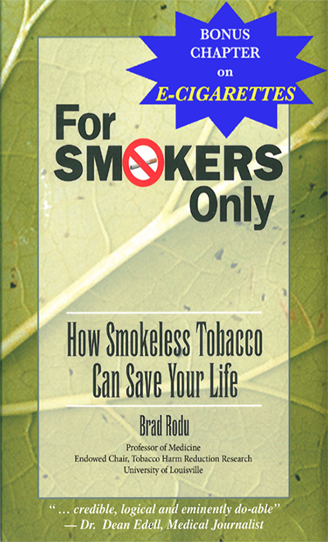In my commentary, “The Electronic Future of Cigarettes,”
published last week in The Atlantic, I described “…a radical transformation in the
way our society uses tobacco…as tobacco consumers switch to smoke-free products
like smokeless tobacco and e-cigarettes.”
One of my longstanding goals has been to correct decades of
misinformation about nicotine and tobacco, in order to introduce safer
smoke-free products to millions of smokers.
The Atlantic
article, available here and reproduced below, conveys a hopeful
message, but optimism in the U.S. is offset by depressing events in
Europe. The British Government two weeks
ago decided to regulate e-cigarettes as medicines (here), a move that will likely deter wider e-cig adoption by smokers. The European Union continues to move forward
with its tobacco directive, which denies vastly safer snus to all but Swedish
smokers and places further restrictions on e-cigarettes.
A blistering public health critique of the European
Commission, the European Council and the Irish Presidency, the World Health
Organization, the European public health lobby and various governmental health
organizations is offered by Clive Bates in his recent web post (here).
The Electronic Future of Cigarettes
Aiming for a tobacco-free society is myopic. Embrace the
safer alternative.
Brad Rodu
The Atlantic, June
20, 2013
We are on the cusp of a radical transformation in the way
our society uses tobacco. Cigarette consumption is in substantial, protracted
decline as tobacco consumers switch to smoke-free products like smokeless
tobacco and e-cigarettes.
This isn't America's first large-scale change in tobacco
habits; in the early 1900s, cigarettes replaced chewing tobacco. This is,
however, the first shift with a promising public health outcome. The reason is
simple science: Smoke-free tobacco and nicotine products are around 98
percent safer than traditional cigarettes.
The evidence has been mounting for a long time.
I published my
first scientific studies on vastly safer smoke-free cigarette
substitutes almost 20 years ago. Britain's Royal College of Physicians,
one of the world's oldest and most prestigious medical societies, reported
in 2002: "As a way of using nicotine, the consumption of
non-combustible [smokeless] tobacco is on the order of 10-1,000 times less
hazardous than smoking, depending on the product." The report continued
with an even bolder statement, acknowledging that some smokeless manufacturers
may want to market their products "as a 'harm reduction' option for
nicotine users, and they may find support for that in the public health
community."
In 2007, the Royal College challenged
governments to consider "...that smokers smoke predominantly for nicotine,
that nicotine itself is not especially hazardous, and that if nicotine could be
provided in a form that is acceptable and effective as a cigarette substitute,
millions of lives could be saved."
Big tobacco companies are already adapting to the demand for
smoke-free tobacco. Altria, the largest American cigarette manufacturer, will
sell e-cigarettes throughout Indiana in August. Number two Reynolds American
believes that "governments, public health officials, tobacco manufacturers
and others share a responsibility to provide adult tobacco consumers with
accurate information
about the various health risks and comparative risks associated with the use of
different tobacco and nicotine products." Reynolds sells Snus, a smokeless
tobacco product that has produced an extraordinarily low smoking rate in
Sweden, under its flagship Camel brand. Reynolds also introduced dissolvable
tobacco products, and it owns a pharmaceutical company that sells nicotine gum.
In July Reynolds will start selling its Vuse e-cigarettes in Colorado.
Lorillard, the nation's third largest cigarette maker, is
taking an aggressive smoke-free posture in the public policy arena as it
promotes its Blu e-cigarette brand. Lorillard CEO Murray Kessler wrote,
"We see e-cigarettes as a product that has the potential to play a
critical role in the national harm reduction discussion and affords our company
a seat at the table in this debate."
Sadly, the potential of tobacco harm reduction is threatened
by opposition from many major medical organizations and government agencies.
Obsessed with a myopic vision of a tobacco-free society, they have transformed
a legitimate war on smoking into a moral crusade against tobacco, a mistake
that was tragically made with alcohol almost 100 years ago.
Congress has prohibited tobacco marketers from any
communication with smokers regarding safer alternatives without the express
approval of the FDA. So far, the agency has taken a hard line, claiming,
falsely, that, "To date, no tobacco products have been scientifically
proven to reduce risk of tobacco-related disease, improve safety or cause less
harm than other tobacco products." The agency is defying a key element of
its stated
mission - "to provide the American public with factual and accurate
information about tobacco products."
In an effort to kill the nascent smoke-free market, the FDA
is slow-walking development of necessary regulations. In March 2012, it signaled
the extraordinary lengths that companies will have to go to in order to have a
product accepted as "modified [i.e., reduced] risk. In essence, the agency
will require dozens of new studies on minute product details and human effects,
which will likely take a decade or more.
This is regulatory fundamentalism, a bureaucratic maze that
will condemn e-cigarettes and smokeless tobacco products, and therefore tobacco
harm reduction, to purgatory. With this delay, cigarettes will continue to
dominate the American tobacco market, and 440,000 more Americans will die from
smoking-related disease every year.
One thousand two hundred and five deaths. Every. Single.
Day.
The body of highly credible research and roster of public
health experts endorsing tobacco harm reduction continues to grow, providing
more science-based support for smokers to switch. In the absence of rational
FDA regulation, nicotine-addicted smokers would do well to quit cigarettes and
avail themselves of the many smoke-free harm reduction products that are
currently on the market.












